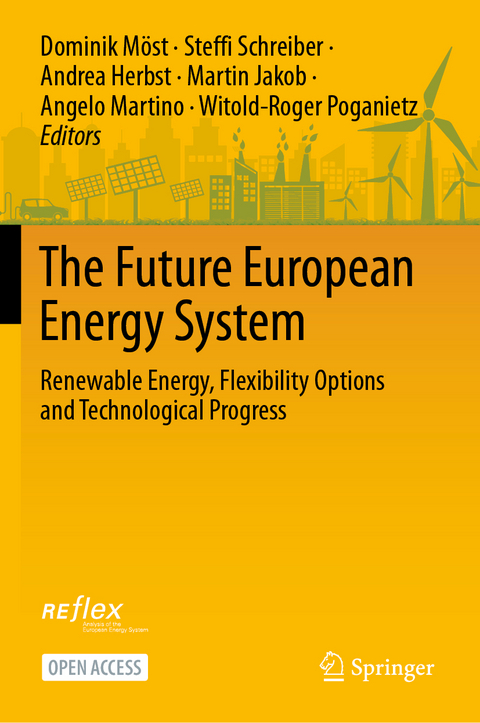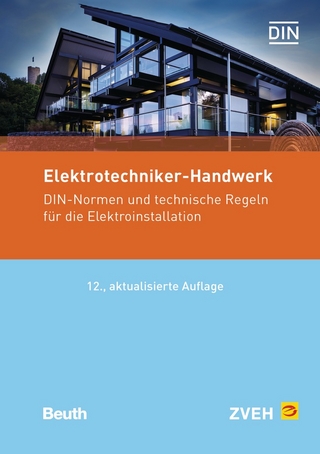
The Future European Energy System
Springer International Publishing (Verlag)
978-3-030-60913-9 (ISBN)
This open access book analyzes the transition toward a low-carbon energy system in Europe under the aspects of flexibility and technological progress. By covering the main energy sectors - including the industry, residential, tertiary and transport sector as well as the heating and electricity sector - the analysis assesses flexibility requirements in a cross-sectoral energy system with high shares of renewable energies. The contributing authors - all European energy experts - apply models and tools from various research fields, including techno-economic learning, fundamental energy system modeling, and environmental and social life cycle as well as health impact assessment, to develop an innovative and comprehensive energy models system (EMS). Moreover, the contributions examine renewable penetrations and their contributions to climate change mitigation, and the impacts of available technologies on the energy system. Given its scope, the book appeals to researchers studying energy systems and markets, professionals and policymakers of the energy industry and readers interested in the transformation to a low-carbon energy system in Europe.
lt;p>
Prof. Dr. Dominik Möst is a Full Professor of Energy Economics at the Technische Universität (TU) Dresden in Germany. From 2013 to 2018, he was Vice Dean of the Faculty of Business and Economics at the TU Dresden. Before his time in Dresden, he headed the research group "Energy System Analysis and Environment" at the Institute for Industrial Production at the Karlsruhe Institute of Technology (KIT-IIP), from 2004 to 2010. His research focus is on energy system analysis and market modeling, energy market design, integration of renewable energies and energy efficiency.
Steffi Schreiber is a Researcher at the Chair of Energy Economics at the Technische Universität (TU) Dresden in Germany. She is one of the coordinators of the REFLEX project funded by the EU's Horizon 2020 research and innovation programme, on which the analysis and results of this book are based. Her research focus is on energy system modeling and analysis of possible decarbonization pathways for the European electricity system, in particular flexibility options and sector coupling, and the system integration of renewable energy sources.
Dr. Andrea Herbst is a Researcher at the Competence Center Energy Technologies and Energy Systems, Fraunhofer Institute for Systems and Innovation Research (ISI) in Karlsruhe, Germany. Her main focus is on the transformation of the industrial sector (deep decarbonization) and future scenarios regarding energy demand and greenhouse gas emissions.
Dr. Martin Jakob, Dipl. Phys. Ing. ETH, is a Co-founder of and Managing Partner at TEP Energy since 2008. Before that he was a Research Associate and Project Manager at the engineering offices of Paul Widmer, at the Paul Scherrer Institute (PSI), and at the Center for Energy Policy and Economics (CEPE) of the ETH Zurich, Switzerland. He holds a doctorate from ETH Zurich in the economics of energy efficiency. His main interest is to integrate technological, economic and policy aspects in empirical, modeling, and implementation projects.
Angelo Martino is a Senior Expert in transport policy analysis and modeling. His cross-disciplinary experience covers various key topics in European transport policy, ranging from energy efficiency to air quality issues, from sustainable transport measures to technology options and from the urban scale to the regional and national. He has previously served at the Polytechnic of Milan: as an Adjunct Professor of Transport Economics and Planning (2007-2010) and of Transport and Traffic Modeling (2002-2009).
Dr. Witold-Roger Poganietz is Head of the research unit "Energy" at the Institute for Technology Assessment and Systems Analysis (ITAS), Karlsruhe Institute of Technology (KIT) in Germany. Since 2015, he has also been Deputy Head of the Focus Area "Energy Systems Analysis" at the KIT Centre Energy. His main research interests are in socio-technological energy scenarios, and in the sustainability assessment of technologies and energy systems.
Part I : Introduction, Scenario Description and Model Coupling Approach
Chapter 1 - Introduction ( Dominik Möst, Steffi Schreiber and Martin Jakob)
Chapter 2 - Scenario Storyline in Context of Decarbonization Pathways for a Future European Energy System ( Andrea Herbst, Steffi Schreiber, Witold-Roger Poganietz, Angelo Martino and Dominik Möst)
Chapter 3 - Model Coupling Approach for the Analysis of the Future European Energy System ( Robert Kunze and Steffi Schreiber )
Part II : Technological Progress
Chapter 4 - Deriving Experience Curves and Implementing Technological Learning in Energy System Models ( Atse Louwen and Martin Junginger )
Chapter 5 - Electric Vehicle Market Diffusion in Main Non-European Markets ( Katrin Seddig, Patrick Jochem and Wolf Fichtner ).- Part III : Demand Side Flexibility and the Role of Disruptive TechnologiesChapter 6 - Future Energy Demand Developments and Demand Side Flexibility in a Decarbonized Central Energy System ( Andrea Herbst, Anna-Lena Klingler, Stephanie Heitel, Pia Manz, Tobias Fleiter, Matthias Rehfeldt, Francesca Fermi, Davide Fiorello, Angelo Martino and Ulrich Reiter)
Chapter 7 - Disruptive Demand Side Technologies: Market Shares and Impact on Flexibility in a Decentralized World ( Stephanie Heitel, Anna-Lena Klingler, Andrea Herbst and Francesca Fermi )
Chapter 8 - What is the Flexibility Potential in the Tertiary Sector? (Ulrich Reiter and Martin Jakob)
Chapter 9 - A Techno-Economic Comparison of Demand Side Management with Other Flexibility Options (Theresa Ladwig)
Part IV: Flexibility Options in the Electricity and Heating Sector
Chapter 10 - Optimal Energy Portfolios in the Electricity Sector: Trade-offs and Interplay between Different Flexibility Options ( Steffi Schreiber, Christoph Zöphel and Dominik Möst )
Chapter 11 - Impact of Electricity Market Designs on Investments in Flexibility Options ( Christoph Fraunholz, Dogan Keles and Wolf Fichtner )
Chapter 12 - Optimal Energy Portfolios in the Heating Sector and the Flexibility Potential of Combined-Heat-Power Plants and District Heating Systems ( Maciej Raczynski, Artur Wyrwa, Marcin Pluta and Wojciech Suwala )
Part V : Analysis of the Environmental and Socio-Impacts beyond the Greenhouse Gas Emission Reduction Targets
Chapter 13 - Unintended Environmental Impacts at Local and Global Scale - Trade-offs of a Low-carbon Electricity System (Maryegli Fuss and Lei Xu)
Chapter 14 - Assessing Social Impacts in Current and Future Electricity Production in the European Union (Nils Brown and David Lindén )Chapter 15 - Spatially Disaggregated Impact Pathway Analysis of Direct Particulate Matter Emissions (Janusz Zysk, Artur Wyrwa, Beata Sliz-Szkliniarz)
Part VI : Concluding Remarks
Chapter 16 - Comprehensive Insights and Recommendations (Dominik Möst, Andrea Herbst, Martin Jakob, Witold-Roger Poganietz, Steffi Schreiber and Christoph Zöphel).
| Erscheinungsdatum | 01.03.2021 |
|---|---|
| Zusatzinfo | XXIX, 309 p. 94 illus., 88 illus. in color. |
| Verlagsort | Cham |
| Sprache | englisch |
| Maße | 155 x 235 mm |
| Gewicht | 676 g |
| Themenwelt | Technik ► Elektrotechnik / Energietechnik |
| Wirtschaft ► Volkswirtschaftslehre | |
| Schlagworte | climate change • Energy market models • Energy System Analysis • energy system models • Life Cycle Assessment • Low-carbon energy system • open access • renewable energy • Strategic energy technology plan of the European Commission • Technological learing |
| ISBN-10 | 3-030-60913-8 / 3030609138 |
| ISBN-13 | 978-3-030-60913-9 / 9783030609139 |
| Zustand | Neuware |
| Haben Sie eine Frage zum Produkt? |
aus dem Bereich


